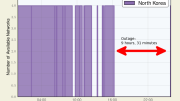 The personal details of thousands of users of three North Korean-related websites have been published by hackers.
The personal details of thousands of users of three North Korean-related websites have been published by hackers.
The details include names, email addresses, user names and in some cases addresses and phone numbers of people to the three sites: the Japan-based Choson Sinbo (????, ????) newspaper, the China-based Ryomyong (??) site and the U.S.-based Korea American National Coordinating Council (?????????).
The details were apparently stolen by hackers working under the banner of the Anonymous group, who have been attacking North Korean-related websites for the last few weeks.
The largest database dump was that of the Choson Sinbo, which contained 3,667 records. The Ryomyong database numbered just over 1,300 users and the KANCC database contained 181 records, but most of the latter were obviously junk.
All three sites carry Korean-language content and appear to have a large number of Korean members, denoted by Hangul names and addresses. In some cases, the addresses listed are inside the DPRK.
The attacks on the websites are part of an ongoing campaign by Anonymous to target North Korean-related sites. Under the name “OpNorthKorea,” the attacks have hit sites both inside the DPRK and those outside.
The attacks began when North Korean state media began issuing threats against U.S. interests in Asia and western media began reporting on those threats.
Two different methods have been used in the attacks: denial of service and hacks. The former involves flooding a website with so much traffic that it becomes overloaded and impossible to access but does not involve breaking into the site. The latter is more malicious and involves breaking through the security of a site and accessing data.
One of the highest profile incidents involved the hacking of China-based Uriminzokkiri site. Roughly 15,000 user details were leaked and the site was defaced with an image of Kim Jong Un with a pig’s snout and ears. The site came back after the hack but appears to be still under attack. It has been offline for most of the last week and is inaccessible at time of writing.




